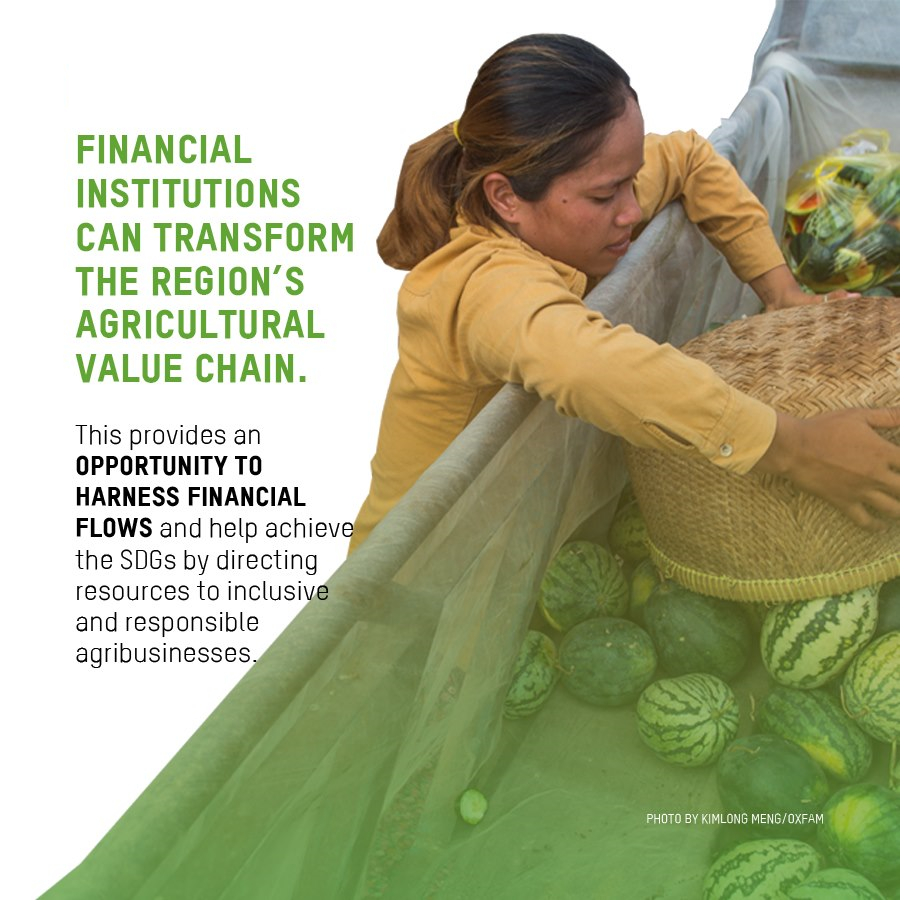
An Op-Ed by Tuan Vu and Bernadette Victorio as seen in Oxfam in Asia, 14 December 2020
We call on financing institutions and large agribusinesses to leverage their influence to promote Environment, Social, and Corporate Governance Standards to transform ASEAN’s agricultural sector and value chain to be sustainable and socially responsible.
The COVID-19 pandemic has had a profound economic impact in the region and disrupted the agricultural food systems across ASEAN, threatening production, increasing food security risks, and affecting small food producers livelihoods.
Agriculture accounts for only 10.3 percent of ASEAN’s Gross Domestic Product (GDP), but it contributes to approximately a third of total employment in the region. Its produce ensures food security not only for ASEAN’s combined 660 million people but also in many other parts of the world through exports.
With the decline in agricultural farm labor affecting 100. 77 million individuals in the region due to COVID-19 restrictions, it is estimated that the aggregate volume of agricultural production in the ASEAN will fall by 3.11 percent or 29.58 million tons. That could lead to a USD 3.76 billion (1.4 percent) decrease in the region’s combined GDP, thereby putting at risk this vital food supply line.
Before the pandemic, ASEAN’s agricultural exports have been picking up. Within the region alone, the value of agriculture trade has increased from just USD 6.4 billion in 2004 to USD 24.7 billion in 2014 and growing. This indicates an emerging import-export market for agriculture that will ultimately attract investments.
Research commissioned by Oxfam and Fair Finance Asia (FFA) shows that between 2014 and 2020, at least USD 45 billion in credit through loans and underwriting services and USD 13.9 billion in investments through shares and bonds were provided to selected agriculture companies operating in the ASEAN by financiers based in Malaysia, Singapore, and Thailand.
The top three biggest creditors were ASEAN banks like Singapore’s DBS Bank, Malaysia’s Maybank, and Thailand’s Siam Commercial Bank. The top three investors were ASEAN-based fund managers like Malaysia’s Permodalan Nasional Berhad, and Singapore’s Temasek Holdings and GIC Private Limited. Except in Myanmar, where Japanese financiers were the major players, ASEAN-based financial institutions are the primary credit and investment providers for agriculture in the ASEAN.
The research further implied that homegrown financial institutions (i.e., banks, investment companies, fund managers) are the major emerging financiers for ASEAN’s agriculture sector. Their business operations policies are likely to transform the region’s agricultural value chain. This provides an opportunity for harnessing finance flows to help achieve the Sustainable Development Goals by directing resources to inclusive and responsible agri-businesses that can help address regional and country-specific social and sustainability challenges.
We welcome the ASEAN policy instruments already in place. The ASEAN Ministers of Agriculture and Forestry’s “ASEAN Guidelines on Promoting Responsible Investment in Food Agriculture and Forestry (ASEAN Guidelines on RAI)” adopted in 2018 provides a roadmap for agribusiness investments to be “socially, economically, and environmentally sustainable and inclusive.” The ASEAN Economic Ministers’ have endorsed the “Guidelines on Promoting Inclusive Business in the ASEAN (ASEAN Guidelines on IB)” outlining “how inclusive businesses can be supported at all levels and the institutional requirements to do so” These policy instruments can guide cross-border investments in supporting sustainable agricultural practices and mitigating the impact of the COVID-19 pandemic.
More than ever, we need the right investments in agriculture to mitigate the impacts of the COVID-19 pandemic and enable countries to adapt to a better future. We at Oxfam and FFA call on the leaders of ASEAN member-states and their dialogue partners to consider and prioritize investments for projects and businesses that can systemically “transform the region’s agricultural systems into resilient, sustainable, productive, and inclusive food systems.” Such investments should generate rural jobs and income, advance women’s economic empowerment, and the interests of disadvantaged groups. They should enable the climate resilience of food-producing countries, promote sustainable agriculture practices, and support the expansion of local business clusters and MSMEs.
We call on financing institutions and large agribusinesses to leverage their influence to promote Environment, Social, and Corporate Governance Standards to transform ASEAN’s agricultural sector and value chain to be sustainable and socially responsible. There is a need for the ASEAN to review and update the ASEAN Comprehensive Agreement in Investments (ACIA), enforced in 2012, to scope the region’s current investment landscape in a post-COVID-19 scenario, and reflect the provisions of recently adopted regional guidelines such as ASEAN RAI and IB Guidelines. Doing so is a step in the right direction for a sustainable development pathway and an integrated economy where policies and incentives encourage investment flows into critical sectors like agriculture. Collective action by ASEAN member-states, financing institutions, and agribusinesses can transform the region’s investment landscape into one that promotes lasting prosperity and well-being for the people. They can bring forth a more equitable and inclusive ASEAN and contribute to a meaningful post-COVID-19 regional economic recovery program.
———————————————————————————————————————————————————————————-
About the Authors
Tuan Vu is the Private Sector Adviser of Oxfam in Asia and its GRAISEA program. Bernadette Victorio is the Regional Program Lead of Fair Finance Asia.